#creating is interesting
Explore tagged Tumblr posts
Text
I think it’s interesting that the stuff you’re influenced by and love is not the same type of stuff that you yourself might create. Like you might really love jazz music, but what comes to you most creatively might be making rock music. I just think it’s interesting how things translate and what comes naturally to one person doesn’t to another.
#creating is interesting#the creative process is interesting#I really want to make music at some point in my life#I’ve never really done it#well except when I was in 6th grade I wrote a little song with like three chords that was simple#but it was jesusy cuz I was raised xtian and I wasn’t really proud of it either so I don’t count that#it was for a talent show too. of course I obviously did not win XD#I won a poetry contest once though#would anyone be interested in seeing the old poem I wrote in high school lol#now I’m rambling
4 notes
·
View notes
Text
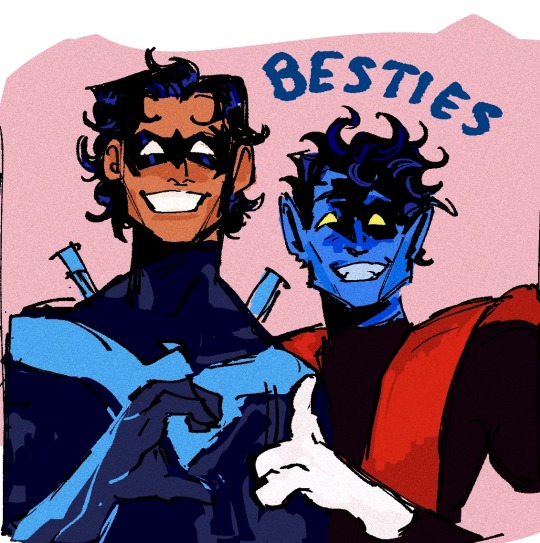
i think they would be very good friends!
#did you guys know kurt was originally created for dc!! very interesting#dick grayson#nightwing#kurt wagner#nightcrawler#x men#dc comics#dc#batman#batfamily#marvel#my art#fanart
10K notes
·
View notes
Text
This is moreover complicated by the fact that the [South African] apartheid state did not acknowledge itself as engaged in a war. The apartheid state in the late 1970s saw itself as engaged in a ‘total onslaught’, preferring to refer to its ‘enemy’ as terrorists rather than declaring an outright war. According to Cock and Nathan, the choice for the apartheid state to define the conflict as unrest or terrorism as opposed to war implied that liberation movement fighters were denied the prisoner of war status granted by the Geneva Protocols to those engaged in war against colonial powers.
— Women combatants and the liberation movements in South Africa (2015) by Siphokazi Magadla
its refreshing to see this so plainly laid out in writing. a terrorist is just someone the state has decided has no rights
#book club#the author is grappling with this through the construction of 'veteran' and how that label is harder to apply to anti-apartheid fighters#due to a lack of distinction between civilian/military and the combined internal + international nature of decolonial resistance#+ the policy problems this creates in post-colonial states with combatant reintegration. anyway interesting text so far
3K notes
·
View notes
Text
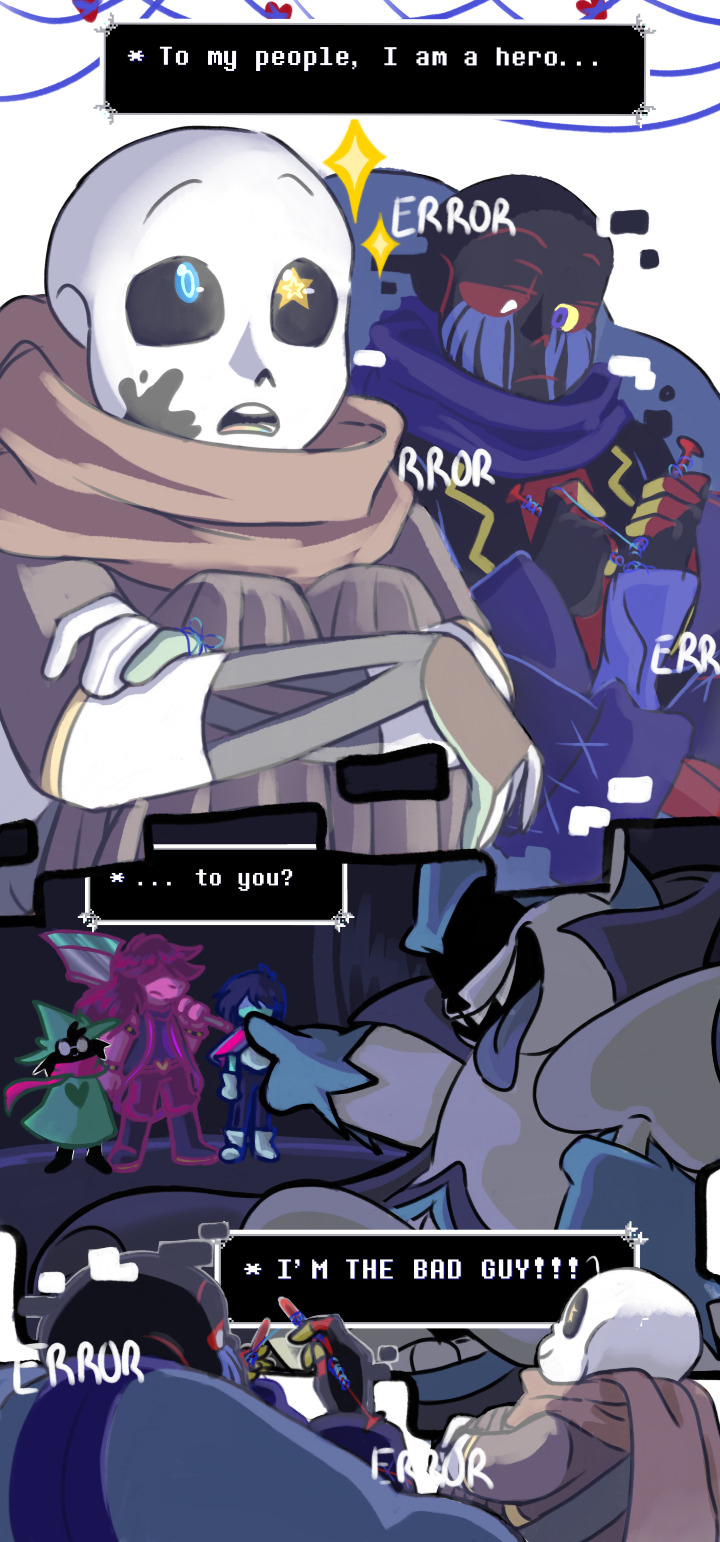
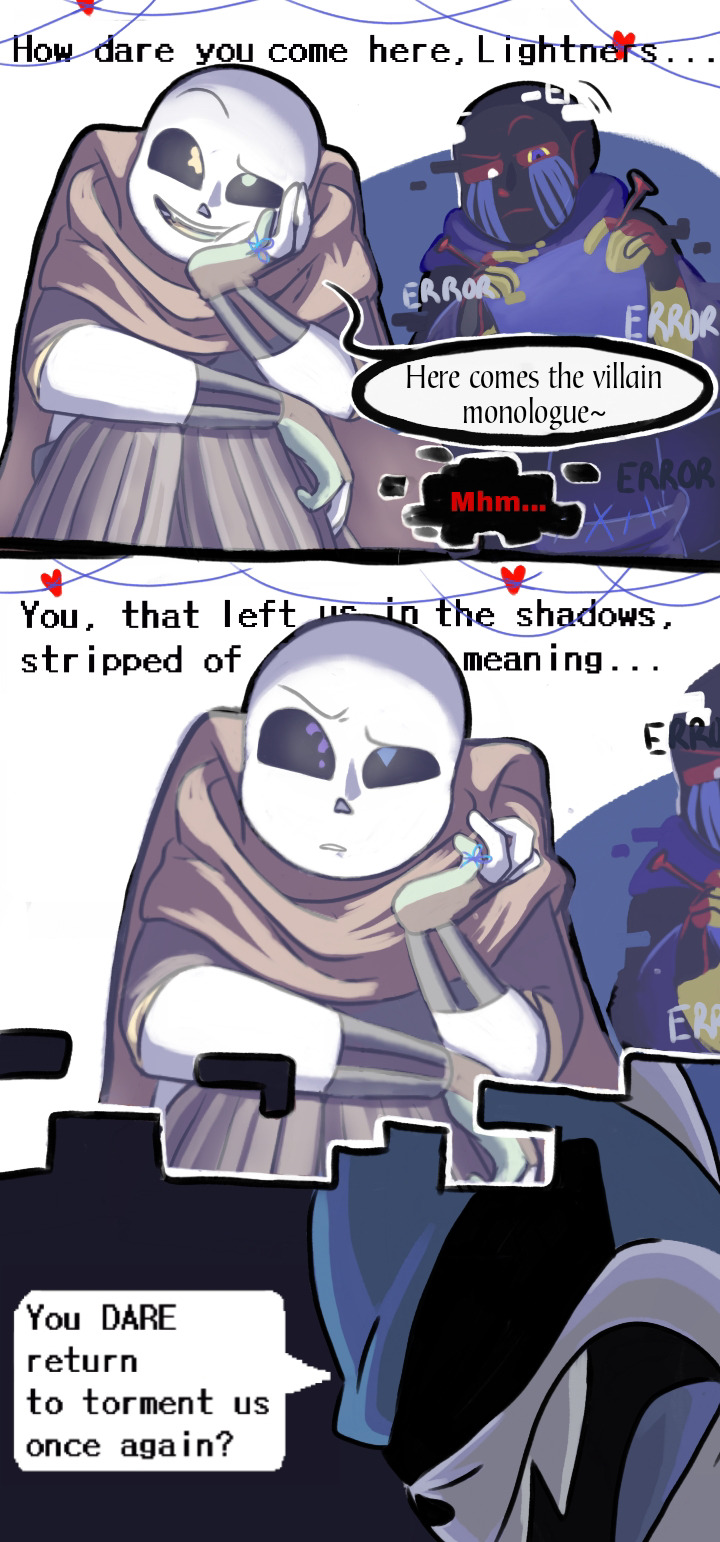

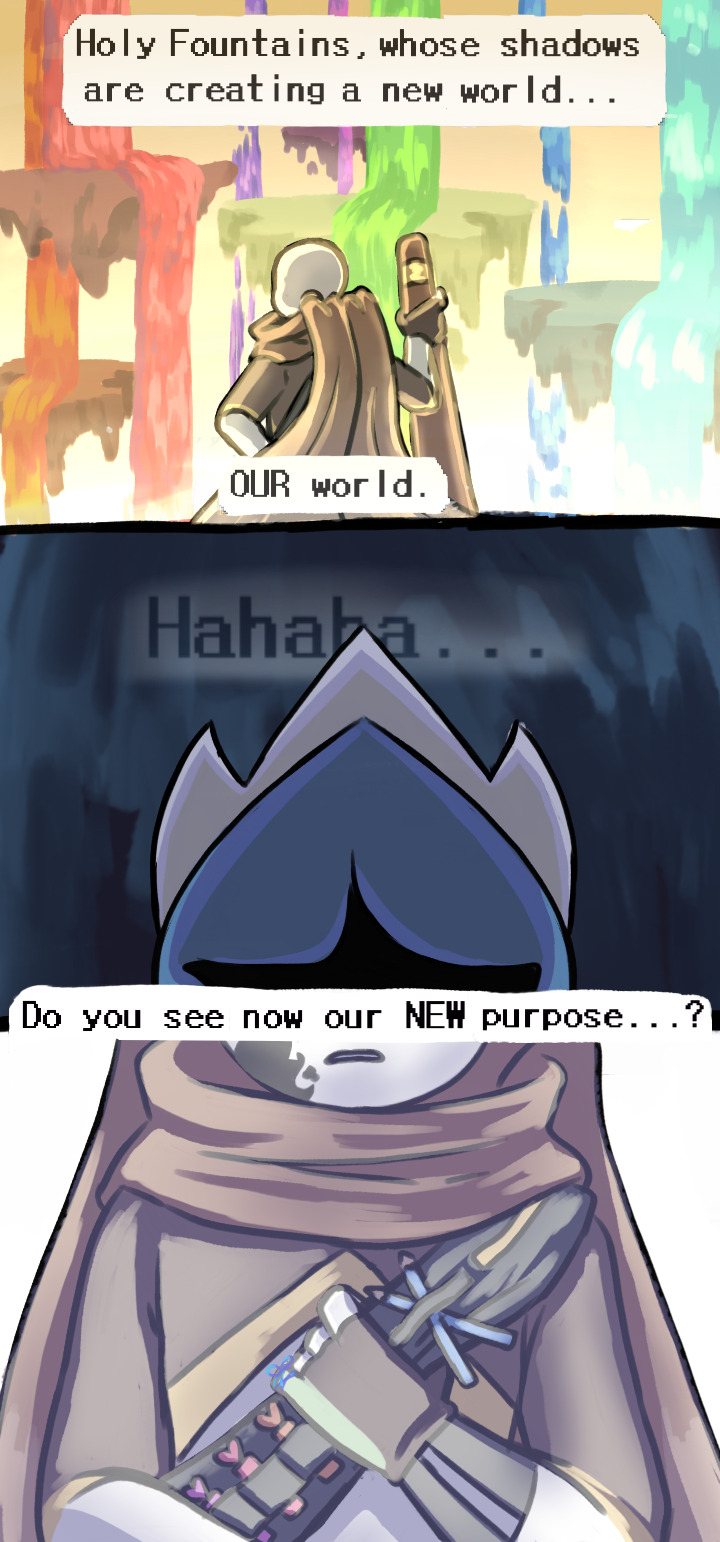
[Abandoned by the Lightners, his heart became cracked with hatred.]
Hitting a lil' too close to home?
#junie art post#ink sans#error sans#utmv#errorink#implied. but yea not the focus#this has been turning around in my mind for quite some time. im glad to finish it lmao idk if my ramblings make sense even.#so like listen. do you ever think about how similar the function of the utmv is to the dark worlds in deltarune.#in a meta narrative to fandom sense? idk the word#we are making exaggerated expanded worlds of the ordinary tools and entertainment of the real world and make it into something more#isnt that very very interesting?#and we explore every sort of possibility in that creation. both good and bad#and when all is said and done. every possibility found and the entertainment and secrets has all run out#we put it away. abandon and leave it behind#what is left? what happens to the world and characters we have created? can it sustain without us?#what of the ones left in the dark?#idk if yall saw me a few months ago but i reblogged comyet's old post of ink begging us not to leave him alone and to keep creating#yea that never left me#and seeing exactly THAT SCENARIO in deltarune made my brain iTCH#imagine an ink in King's position.... wait isnt that just underverse#mmmmmmm. darkner ink.....#also error is here too. not just for errorink or that i can't separate these two to save my life#but error is also one of the few people to be able to GET IT?? he can hear the creators too. ink cant#but hes pretty much programmed himself to avoid having a mental break down to this via reboot memory loss.#and ink has his own internal coping mechanism (hooray for short term memory loss)#these two idiots will do anything but confront truths lmfao#ahhh my favorite idiots. never change#mmmmm#deltarune
3K notes
·
View notes
Text


got an impulse to animate a little
#art#animation#drawing#western#cowboy#ocs#honeybee#grimm#yarrow#looked in my animation tag like when was the last time. i posted anything there. four years ago#animation is like. i know enough about it to probably be semi-competent at it if i tried but it is not a medium in which#i feel any real call to express my ideas in. like i'm more interested in implying motion and movement in a static image#than actually creating said motion#plus if i feel the need to draw the same shit over and over i'll usually just make a comic hgkflhd#but! it's fun to play with in short little six-frame things that keep my attention#my art
1K notes
·
View notes
Text
Forever creating autistic characters not because I intended to create an autistic character but because I intended to create a character in general and while creating them I simply completely forgor how allistic people act
#created an oc who was not supposed to b autistic but I accidentally hinged large amounts of the plot on a special interest of his and so#writing#jory.txt
12K notes
·
View notes
Text
also in regards to that last article about varied ways of thinking about psychosis/altered states that don't just align with medical model or carceral psychiatry---I always love sharing about Bethel House and their practices of peer support for schizophrenia that are founded on something called tojisha kenkyu, but I don't see it mentioned as often as things like HVN and Soteria House.

ID: [A colorful digital drawing of a group of people having a meeting inside a house while it snows outside.]
"What really set the stage for tōjisha-kenkyū were two social movements started by those with disabilities. In the 1950s, a new disability movement was burgeoning in Japan, but it wasn’t until the 1970s that those with physical disabilities, such as cerebral palsy, began to advocate for themselves more actively as tōjisha. For those in this movement, their disability is visible. They know where their discomfort comes from, why they are discriminated against, and in what ways they need society to change. Their movement had a clear sense of purpose: make society accommodate the needs of people with disabilities. Around the same time, during the 1970s, a second movement was started by those with mental health issues, such as addiction (particularly alcohol misuse) and schizophrenia. Their disabilities are not always visible. People in this second movement may not have always known they had a disability and, even after they identify their problems, they may remain uncertain about the nature of their disability. Unlike those with physical and visible disabilities, this second group of tōjisha were not always sure how to advocate for themselves as members of society. They didn’t know what they wanted and needed from society. This knowing required new kinds of self-knowledge.
As the story goes, tōjisha-kenkyū emerged in the Japanese fishing town of Urakawa in southern Hokkaido in the early 2000s. It began in the 1980s when locals who had been diagnosed with psychiatric disorders created a peer-support group in a run-down church, which was renamed ‘Bethel House’. The establishment of Bethel House (or just Bethel) was also aided by the maverick psychiatrist Toshiaki Kawamura and an innovative social worker named Ikuyoshi Mukaiyachi. From the start, Bethel embodied the experimental spirit that followed the ‘antipsychiatry’ movement in Japan, which proposed ideas for how psychiatry might be done differently, without relying only on diagnostic manuals and experts. But finding new methods was incredibly difficult and, in the early days of Bethel, both staff and members often struggled with a recurring problem: how is it possible to get beyond traditional psychiatric treatments when someone is still being tormented by their disabling symptoms? Tōjisha-kenkyū was born directly out of a desperate search for answers.
In the early 2000s, one of Bethel’s members with schizophrenia was struggling to understand who he was and why he acted the way he did. This struggle had become urgent after he had set his own home on fire in a fit of anger. In the aftermath, he was overwhelmed and desperate. At his wits’ end about how to help, Mukaiyachi asked him if perhaps he wanted to kenkyū (to ‘study’ or ‘research’) himself so he could understand his problems and find a better way to cope with his illness. Apparently, the term ‘kenkyū’ had an immediate appeal, and others at Bethel began to adopt it, too – especially those with serious mental health problems who were constantly urged to think about (and apologise) for who they were and how they behaved. Instead of being passive ‘patients’ who felt they needed to keep their heads down and be ashamed for acting differently, they could now become active ‘researchers’ of their own ailments. Tōjisha-kenkyū allowed these people to deny labels such as ‘victim’, ‘patient’ or ‘minority’, and to reclaim their agency.
Tōjisha-kenkyū is based on a simple idea. Humans have long shared their troubles so that others can empathise and offer wisdom about how to solve problems. Yet the experience of mental illness is often accompanied by an absence of collective sharing and problem-solving. Mental health issues are treated like shameful secrets that must be hidden, remain unspoken, and dealt with in private. This creates confused and lonely people, who can only be ‘saved’ by the top-down knowledge of expert psychiatrists. Tōjisha-kenkyū simply encourages people to ‘study’ their own problems, and to investigate patterns and solutions in the writing and testimonies of fellow tōjisha.
Self-reflection is at the heart of this practice. Tōjisha-kenkyū incorporates various forms of reflection developed in clinical methods, such as social skills training and cognitive behavioural therapy, but the reflections of a tōjisha don’t begin and end at the individual. Instead, self-reflection is always shared, becoming a form of knowledge that can be communally reflected upon and improved. At Bethel House, members found it liberating that they could define themselves as ‘producers’ of a new form of knowledge, just like the doctors and scientists who diagnosed and studied them in hospital wards. The experiential knowledge of Bethel members now forms the basis of an open and shared public domain of collective knowledge about mental health, one distributed through books, newspaper articles, documentaries and social media.
Tōjisha-kenkyū quickly caught on, making Bethel House a site of pilgrimage for those seeking alternatives to traditional psychiatry. Eventually, a café was opened, public lectures and events were held, and even merchandise (including T-shirts depicting members’ hallucinations) was sold to help support the project. Bethel won further fame when their ‘Hallucination and Delusion Grand Prix’ was aired on national television in Japan. At these events, people in Urakawa are invited to listen and laugh alongside Bethel members who share stories of their hallucinations and delusions. Afterwards, the audience votes to decide who should win first prize for the most hilarious or moving account. One previous winner told a story about a failed journey into the mountains to ride a UFO and ‘save the world’ (it failed because other Bethel members convinced him he needed a licence to ride a UFO, which he didn’t have). Another winner told a story about living in a public restroom at a train station for four days to respect the orders of an auditory hallucination. Tōjisha-kenkyū received further interest, in and outside Japan, when the American anthropologist Karen Nakamura wrote A Disability of the Soul: An Ethnography of Schizophrenia and Mental Illness in Contemporary Japan (2013), a detailed and moving account of life at Bethel House. "
-Japan's Radical Alternative to Psychiatric Diagnosis by Satsuki Ayaya and Junko Kitanaka
#personal#psych abolition#mad liberation#psychosis#altered states#antipsych#antipsychiatry#mad pride#peer support#schizophrenia#i have a pdf of the book somewhere if anyone wants#the book and the documentary also discuss some of the pratical struggles in creating a community like this which i also found helpful as#someone who is very interested in helping open a peer respite.
2K notes
·
View notes
Text
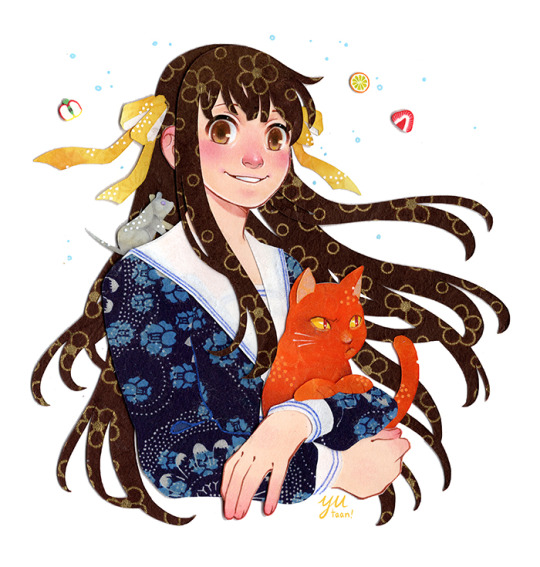
Papercraft Tohru - and Yuki, and Kyo! And some little fruit details, because, after all... Fruits Basket! 🍎
I got pretty emotional making this one! Fruits Basket had a huge, profound effect on me in my teens, and I often curled up with it for comfort and a sense of companionship during hard times. Now as an adult, it's been a while since I've read the whole series through, but I pick up random volumes fairly often and skim through them to get that familiar rush of warmth. It's still such a lovely series!
#fruits basket#tohru honda#yuki sohma#kyo sohma#papercraft#papercutting#paper art#traditional art#my art#it was interesting to grow with the series#as a teen the first half resonated with me most#and while I enjoyed the second half I didn't love it quite the same way#as a young adult rereading the series I enjoyed the first half but didn't feel that same resonance#whereas when I hit the second half THERE was the jolt of Oh! It's me!!#as a full-on adult human I always get nostalgic and happy when rereading old volumes#but while I can remember identifying with the characters with my ENTIRE VIBRATING SOUL the feeling is less intense nowadays#then the sequel came out and I figured Heck yeah time to check in on the old faves. Nostalgia time#half a chapter in and BAM! sitting on the floor full-on crying!!!#they made it! these characters I loved and grew with made it!!#they reached adulthood and created families and found their happinesses and loved and loved and loved!!!#and so have I!!!!!!#the takeaway is that fruits basket is VERY powerful and I will be in its gentle grip forever apparently
1K notes
·
View notes
Text


2011 and 2025
#artists on tumblr#sketch#illustration#I figured out that I lost my ability to write and create more interesting plots was because of ptsd ☹️#I always blamed myself for lack of talent and creativity and my path was like I tried to ruin the brick wall by my head#I wander if I could be more successful just because I got the nessesary support at right time...#dragon age#dragon age2#anders#I know many people don't like this character#but we collected almost the same traumas 🫠 His story strangely felt like supportive. At least I wasn't alone
749 notes
·
View notes
Text




me when i get the opportunity to think about speculative biology and non-existent game mechanics in media i like
⠀
#the candle creatures are revamps#i had created the idea for them years ago but i wanted to redo them slightly with new eyes#the “dark variants” of the mantas and birds are variants of them that have adapted for life in wasteland and the forests#and also#i like the idea of candle creatures that live in villages or within communities#that are sort of akin to strays that the whole community takes care of#means alot to me#this isnt everything ive been thinking about#ill make a couple diagrams about the large birds#yknow the ones from rhythm that we see once and never again. yeah.#they exist in my heart#anyway#skycotl#sky cotl#sky children of the light#sky#sky:cotl#sky: cotl#thatskygame#speculative biology#<- i guess?#im having fun ok#im happy to answer questions about my thoughts btw!#might be answered on my main if i cant muster a doodle or something#but i love answering asks#so if ur interested id love to hear thoughts :)
3K notes
·
View notes
Text





Mykonos, 10:14 AM
Friends, acquaintances, even family had brought up the idea of a second child, in passing, in conversation. But Rob hadn’t. Until now. He knew it had been difficult for Valerie. It’s not that she doesn’t want more. Just that she’s only just found herself again.
#I posted the scene of this on my simstok for people that are interested!#this was so much fun to create#ts4#ts4 simblr#the sims 4#sims 4#the sims 4 simblr#sims 4 screenshots#ts4 screenshots#brownstone*#pixelglam#showusyoursims#the sims community#the sims 4 screenshots#ts4 aesthetic#sims community
437 notes
·
View notes
Text
Jason and Cass' opposing views on murder is so interesting. Their conflict is not purely moralistic - that is to say, it's not purely that Jason thinks murder is okay, and Cass doesn't. It's their identities, their original and most fundamental worldview. Jason is a murder victim and Cass is a murderer. Yes, Jason kills people as Red Hood, and yes, Cass dies multiple times, but this never truly erases how they see themselves. Jason will always have been murdered, and Cass will always be a murderer. They are unable to fully extricate themselves from those roles, and thus will never approach life or death the same way.
#cassandra cain#jason todd#so i may have spent thirty minutes reading jason meta#cass will always be my fav but damn if jason meta doesn't hit on a spiritual level#that boy is messed up#idk if this post makes any sense?? jason experts feel free to correct me#it's interesting too how so much of their trajectory is trying to change that identity as victim or villain#jason becoming red hood is creating the autonomy being a victim denied him#cass becoming batgirl is creating the autonomy being a (forced) murderer denied her#yet they both are unable to truly let go of what the world made them#thus both being perpetually haunted by their past selves#meta
3K notes
·
View notes
Text

北へ。/ Kita e. White Illumination (1999) Sega Dreamcast
#Kita e. White Illumination#vn#the y2k~ era of console visual novels are such an untapped repistory of interesting and experimental imagery#most of them never get dumped anywhere because they’re non-h#inaccessible etc.#but the physical data limitations paired with newly developed art software creates stuff you couldn’t really make if you were trying to#and incidentally industrial trade occupations is perhaps my favorite underrepresented type of gap moe
1K notes
·
View notes
Text






“things were so hard with dad in recent years...how did he go from paparapluie to père? i wish i could face him and understand, but while he was still here i didn't dare try to tell him [any of my feelings] and now...it's too late.” * paparapluie is a pun on the words papa and parapluie (umbrella) since the plush is a frog. père is the french word for 'father.'
#ml spoilers#ml s6 spoilers#miraculous spoilers#ml el toro de piedra#mledit#miraculous#miraculous ladybug#miraculous lb#miraculousedit#adrien agreste#adrienette#adrinette#my edits#fascinated at umbrellas constantly being a motif for protection in this show. the theme is “in the rain” because marinette fell for adrien#in the rain but he offered her an umbrella (an act of kindness and protection from the weather). next to how#adrien's father used a pun about umbrellas as his own nickname when adrien was younger and he was still caring for him as a dad should#but as he got older his father stopped protecting him so the nickname (and also any form of 'papa') fell through in favor of the#cold + formal + distant 'père.' this specific pun between parapluie and papa might also come from the french poem un papa by pierre ruaud#which is a poem about papas serving as protection and a sort of shelter for their children. so ig ml is saying gabriel started this way too#i think the fandom glosses over the complexity of adrien's feelings for his father bc in earlier seasons he defended + made excuses for him#part of this is because he was sheltered + didn't know better but it's also bc he DOES recall a time before his mother's illness grew worse#(some time between age 6 and the werepapas flashback) when he didn't have an absentee father. the show writes gabriel agreste#inconsistently: in earlier seasons he had moments of concern for his son before he became awful all the time. and these on/off moments give#adrien whiplash because he's left doing things like becoming a model for his father (i'm choosing to believe gabriel didn't use the rings#until later bc much of the earlier seasons make no sense if he was controlling adrien) in the hopes that they'll bond only to realize#his father still won't spend time with him even for a meal. s5 has gabriel making him pancakes (the wrong way) and asking about his day#and his friends and interests only for him to become even more controlling and mean. how he let him quit modeling only to create an#AI version of him without his consent and when he said that made him feel uncomfortable gabriel convinced him it was fine bc now he had#more free time! only to still control how he spent that free time. adrien didn't start grappling with these things until s5#and now he laments the things he never actually got to say about the papa he misses and the father he wished had unconditionally loved him
1K notes
·
View notes
Text

he wanted to be scourge sooo bad

#kokichi ouma#kokichi oma#scourge wc#danganronpa#danganronpa v3#ndrv3#drv3#my art#my posts#fanart#p#blood tw#tw blood#chuunibyou reading of kokichi is underrated i think#<- (opinion of a guy with a vested interest in making more characters who suck)#anyway ive been meaning to draw this forever cause of their aesthetic similarities#but also kinda aligns with popular fanon ouma backstory (as i perceive it)#like unloved orphan runt who lies to protect himself and accidentally creates ‘evil organization’#+ scourge also had a lying thing as a kit iirc#except scourge was genuinely badass and kokichi is lowkey cringe. just a glimpse into his dark perspective.
415 notes
·
View notes